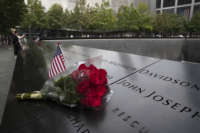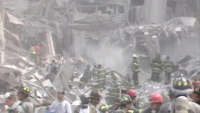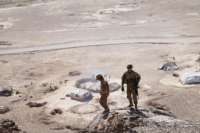
Twenty years ago this week, the terrorist organization al-Qaeda, whose origins date back to 1979 when Soviet troops invaded Afghanistan, hijacked four airplanes and carried out suicide attacks against the Twin Towers and the Pentagon in the United States. Shortly thereafter, the administration of George W. Bush embarked on a “global war on terror”: It invaded Afghanistan and, a year later, after having toppled the Taliban government, raised the specter of an “Axis of Evil” comprising Iraq, Iran and North Korea, thereby preparing the stage for more invasions. Interestingly enough, Saudi Arabia, whose royal family, according to certain intelligence reports, had been financing al-Qaeda, was not included on the list. Instead, it was Iraq that the U.S. invaded in 2003, toppling a brutal dictator (Saddam Hussein) who had committed most of his crimes as a U.S. ally and was a sworn enemy of al-Qaeda and of other Islamic fundamentalist terrorist organizations because of the threat they posed to his secular regime.
The outcome of the 20-year war on terror, which ended with the Taliban’s return to power, has been disastrous on multiple fronts, as Noam Chomsky pointedly elaborates in a breathtaking interview, which also reveals the massive level of hypocrisy that belies the actions of the global empire.
C.J. Polychroniou: Nearly 20 years have passed since the September 11 terrorist attacks in 2001. With nearly 3,000 dead, this was the deadliest attack on U.S. soil in history and produced dramatic ramifications for global affairs, as well as startling impacts on domestic society. I want to start by asking you to reflect on the alleged revamping of U.S. foreign policy under George W. Bush as part of his administration’s reaction to the rise of Osama bin Laden and the jihadist phenomenon. First, was there anything new to the Bush Doctrine, or was it simply a codification of what we had already seen take place in the 1990s in Iraq, Panama, Bosnia and Kosovo? Second, was the U.S.-NATO led invasion of Afghanistan legal under international law? And third, was the U.S. ever committed to nation-building in Afghanistan?
Noam Chomsky: Washington’s immediate reaction to 9/11/2001 was to invade Afghanistan. The withdrawal of U.S. ground forces was timed to (virtually) coincide with the 20th anniversary of the invasion. There has been a flood of commentary on the 9/11 anniversary and the termination of the ground war. It is highly illuminating, and consequential. It reveals how the course of events is perceived by the political class, and provides useful background for considering the substantive questions about the Bush Doctrine. It also yields some indication of what is likely to ensue.
Of utmost importance at this historic moment would be the reflections of “the decider,” as he called himself. And indeed, there was an interview with George W. Bush as the withdrawal reached its final stage, in the Washington Post.
In the Style section.
The article and interview introduce us to a lovable, goofy grandpa, enjoying banter with his children, admiring the portraits he had painted of Great Men that he had known in his days of glory. There was an incidental comment on his exploits in Afghanistan and the follow-up episode in Iraq:
Bush may have started the Iraq War on false pretenses, but at least he hadn’t inspired an insurrection that turned the U.S. Capitol into a combat zone. At least he had made efforts to distance himself from the racists and xenophobes in his party rather than cultivate their support. At least he hadn’t gone so far as to call his domestic adversaries “evil.”
“He looks like the Babe Ruth of presidents when you compare him to Trump,” former Senate Majority Leader and one-time Bush nemesis Harry M. Reid (D-Nevada) said in an interview. “Now, I look back on Bush with a degree of nostalgia, with some affection, which I never thought I would do.”
Way down on the list, meriting only incidental allusion, is the slaughter of hundreds of thousands; many millions of refugees; vast destruction; a regime of hideous torture; incitement of ethnic conflicts that have torn the whole region apart; and as a direct legacy, two of the most miserable countries on Earth.
First things first. He didn’t bad-mouth fellow Americans.
The sole interview with Bush captures well the essence of the flood of commentary. What matters is us. There are many laments about the cost of these ventures: the cost to us, that is, which “have exceeded $8 trillion, according to new estimates by the Costs of War project at Brown University,” along with American lives lost and disruption of our fragile society.
Next time we should assess the costs to us more carefully, and do better.
There are also well-justified laments about the fate of women under Taliban rule. The laments sometimes are no doubt sincere, though a natural question arises: Why weren’t they voiced 30 years ago when U.S. favorites, armed and enthusiastically supported by Washington, were terrorizing young women in Kabul who were wearing the “wrong” clothes, throwing acid in their faces and other abuses? Particularly vicious were the forces of the arch-terrorist, Gulbuddin Hekmatyar, recently on the U.S. negotiating team.
The achievements in women’s rights in Russian-controlled cities in the late ‘80s, and the threats they faced from the CIA-mobilized radical Islamist forces, were reported at the time by a highly credible source, Rasil Basu, a distinguished international feminist activist who was UN representative in Afghanistan in those years, with special concern for women’s rights.
Basu reports:
During the [Russian] occupation, in fact, women made enormous strides: illiteracy declined from 98% to 75%, and they were granted equal rights with men in civil law, and in the Constitution. This is not to say that there was complete gender equality. Unjust patriarchal relations still prevailed in the workplace and in the family with women occupying lower level sex-type jobs. But the strides they took in education and employment were very impressive.
Basu submitted articles on these matters to the major U.S. journals, along with the feminist journal Ms. Magazine. No takers, wrong story. She was, however, able to publish her report in Asia: Asian Age, on December 3, 2001.
We can learn more about how Afghans in Kabul perceive the late years of the Russian occupation, and what followed, from another expert source, Rodric Braithwaite, British ambassador to Moscow from 1988 to 1992, and then chairman of the Joint Intelligence Committee, also author of the major scholarly work on the Soviets in Afghanistan.
Braithwaite visited Kabul in 2008, and reported his findings in the London Financial Times:
In Afghanistan today new myths are building up. They bode ill for current western policy. On a recent visit I spoke to Afghan journalists, former Mujahideen, professionals, people working for the ‘coalition’ — natural supporters for its claims to bring peace and reconstruction. They were contemptuous of [US-imposed] President Hamid Karzai, whom they compared to Shah Shujah, the British puppet installed during the first Afghan war. Most preferred Mohammad Najibullah, the last communist president, who attempted to reconcile the nation within an Islamic state, and was butchered by the Taliban in 1996: DVDs of his speeches are being sold on the streets. Things were, they said, better under the Soviets. Kabul was secure, women were employed, the Soviets built factories, roads, schools and hospitals, Russian children played safely in the streets. The Russian soldiers fought bravely on the ground like real warriors, instead of killing women and children from the air. Even the Taliban were not so bad: they were good Muslims, kept order, and respected women in their own way. These myths may not reflect historical reality, but they do measure a deep disillusionment with the ‘coalition’ and its policies.
The policies of the “coalition” were brought to the public in New York Times correspondent Tim Weiner’s history of the CIA. The goal was to “kill Soviet Soldiers,” the CIA station chief in Islamabad declared, making it clear that “the mission was not to liberate Afghanistan.”
His understanding of the policies he was ordered to execute under President Ronald Reagan is fully in accord with the boasts of President Jimmy Carter’s National Security Adviser Zbigniew Brzezinski about their decision to support radical Islamist jihadis in 1979 in order to draw the Russians into Afghanistan, and his pleasure in the outcome after hundreds of thousands of Afghans were killed and much of the country wrecked: “What is more important in world history? The Taliban or the collapse of the Soviet empire? Some agitated Moslems or the liberation of Central Europe and the end of the cold war?”
It was recognized early on by informed observers that the Russian invaders were eager to withdraw without delay. The study of Russian archives by historian David Gibbs resolves any doubts on the matter. But it was much more useful for Washington to issue rousing proclamations about Russia’s terrifying expansionist goals, compelling the U.S., in defense, to greatly expand its own domination of the region, with violence when needed (the Carter Doctrine, a precursor of the Bush Doctrine).
The Russian withdrawal left a relatively popular government in place under Najibullah, with a functioning army that was able to hold its own for several years until the U.S.-backed radical Islamists took over and instituted a reign of terror so extreme that the Taliban were widely welcomed when they invaded, instituting their own harsh regime. They kept on fairly good terms with Washington until 9/11.
Returning to the present, we should indeed be concerned with the fate of women, and others, as the Taliban return to power. For those sincerely concerned to design policies that might benefit them, a little historical memory doesn’t hurt.
The same is true in other respects as well. The Taliban have promised not to harbor terrorists, but how can we believe them, commentators warn, when this promise is coupled with the outrageous claim by their spokesman Zabihullah Mujahid that there is “no proof” that Osama bin Laden was responsible for the 9/11 attack?
There is one problem with the general ridicule of this shocking statement. What Mujahid actually said was both accurate and very much worth hearing. In his words, “When Osama bin Laden became an issue for the Americans, he was in Afghanistan. Although there was no proof he was involved” in 9/11.
Let’s check. In June 2002, eight months after 9/11, FBI Director Robert Mueller made his most extensive presentation to the national press about the results of what was probably the most intensive investigation in history. In his words, “investigators believe the idea of the Sept. 11 attacks on the World Trade Center and Pentagon came from al Qaeda leaders in Afghanistan,” though the plotting and financing apparently trace to Germany and the United Arab Emirates. “We think the masterminds of it were in Afghanistan, high in the al Qaeda leadership.”
What was only surmised in June 2002 could not have been known eight months earlier when the U.S. invaded. Mujahid’s outrageous comment was accurate. The ridicule is another example of convenient amnesia.
Keeping Mujahid’s accurate statement in mind, along with Mueller’s confirmation of it, we can move towards understanding the Bush Doctrine.
While doing so, we might listen to Afghan voices. One of the most respected was Abdul Haq, the leading figure in the anti-Taliban Afghan resistance and a former leader of the U.S.-backed Mujahideen resistance to the Russian invasion. A few weeks after the U.S. invasion, he had an interview with Asia scholar Anatol Lieven.
Haq bitterly condemned the U.S. invasion, which, he recognized, would kill many Afghans and undermine the efforts to overthrow the Taliban from within. He said that “the US is trying to show its muscle, score a victory and scare everyone in the world. They don’t care about the suffering of the Afghans or how many people we will lose.”
Haq was not alone in this view. A meeting of 1,000 tribal elders in October 2001 unanimously demanded an end to the bombing, which, they declared, is targeting “innocent people.” They urged that means other than slaughter and destruction be employed to overthrow the hated Taliban regime.
The leading Afghan women’s rights organization, Revolutionary Association of the Women of Afghanistan (RAWA), issued a declaration on October 11, 2001, strongly opposing the “vast aggression on our country” by the U.S., which will shed the blood of innocent civilians. The declaration called for “eradication of the plague of the Taliban and al-Qaeda” by the “uprising of the Afghan nation,” not by a murderous assault of foreign aggressors.
All public at the time, all ignored as irrelevant, all forgotten. The opinions of Afghans are not our concern when we invade and occupy their country.
The perception of the anti-Taliban Afghan resistance was not far from the stance of President Bush and his Defense Secretary Donald Rumsfeld. Both dismissed Taliban initiatives to send bin Laden for trial abroad despite Washington’s refusal to provide evidence (which it didn’t have). Finally, they refused Taliban offers to surrender. As the president put it, “When I said no negotiations, I meant no negotiations.” Rumsfeld added, “We don’t negotiate surrenders.” E.g., we’re going to show our muscle and scare everyone in the world.
The imperial pronouncement at the time was that those who harbor terrorists are as guilty as the terrorists themselves. The shocking audacity of that proclamation passed almost unnoticed. It was not accompanied by a call to bomb Washington, as it obviously implied. Even putting aside the world-class terrorists in high places, the U.S. harbors and abets retail terrorists who keep to such acts as blowing up Cuban commercial airliners, killing many people, part of the long U.S. terrorist war against Cuba.
Quite apart from that scandal, it is worth stating the unspeakable: The U.S. had no charge against the Taliban. No charge, before 9/11 or ever. Before 9/11, Washington was on fairly good terms with the Taliban. After 9/11, it demanded extradition (without even a pretense of providing required evidence), and when the Taliban agreed, Washington refused the offers: “We don’t negotiate surrenders.” The invasion was not only a violation of international law, as marginal a concern in Washington as the anti-Taliban Afghan resistance, but also had no credible pretext on any grounds.
Pure criminality.
Furthermore, ample evidence is now available showing that Afghanistan and al-Qaeda were not of much interest to the Bush-Cheney-Rumsfeld triumvirate. They had their eyes on much bigger game than Afghanistan. Iraq would be the first step, then the entire region. I won’t review the record here. It’s well-documented in Scott Horton’s book, Fool’s Errand.
That’s the Bush Doctrine. Rule the region, rule the world, show our muscle so that the world knows that “What we say goes,” as Bush I [George H.W. Bush] put it.
It’s hardly a new U.S. doctrine. It’s also easy to find precursors in imperial history. Simply consider our predecessor in world control, Britain, a grand master of war crimes, whose wealth and power derived from piracy, slavery and the world’s greatest narco-trafficking enterprise.
And in the last analysis, “Whatever happens, we have got, The Maxim gun, and they have not.” Hilaire Belloc’s rendition of Western civilization. And pretty much Abdul Haq’s insight into the imperial mindset.
Nothing reveals reigning values more clearly than the mode of withdrawal. The Afghan population was scarcely a consideration. The imperial “deciders” do not trouble to ask what people might want in the rural areas of this overwhelmingly rural society where the Taliban live and find their support, perhaps grudging support as the best of bad alternatives. Formerly a Pashtun movement, the “new Taliban” evidently have a much broader base. That was dramatically revealed by the quick collapse of their former enemies, the vicious warlord Abdul Rashid Dostum, along with Ismail Khan, bringing other ethnic groups within the Taliban network. There are also Afghan peace forces that should not be summarily dismissed. What would the Afghan population want if they had a choice? Could they, perhaps, reach local accommodations if given time before a precipitous withdrawal? Whatever the possibilities might have been, they do not seem to have been considered.
The depth of contempt for Afghans was, predictably, reached by Donald Trump. In his unilateral withdrawal agreement with the Taliban in February 2020, he did not even bother to consult with the official Afghan government. Worse still, Bush administration foreign policy specialist Kori Schake reports, Trump forced the Afghan government to release 5,000 Taliban fighters and relax economic sanctions. He agreed that the Taliban could continue to commit violence against the government we were there to support, against innocent people and against those who’d assisted our efforts to keep Americans safe. All the Taliban had to do was say they would stop targeting U.S. or coalition forces, not permit al-Qaeda and other terrorist organizations to use Afghan territory to threaten U.S. security and subsequently hold negotiations with the Afghan government.
As usual, what matters is us, this time amplified by Trump’s signature cruelty. The fate of Afghans is of zero concern.
Trump timed the withdrawal for the onset of the summer fighting season, reducing the hope for some kind of preparation. President Joe Biden improved the terms of withdrawal a little, but not enough to prevent the anticipated debacle. Then came the predictable reaction of the increasingly shameless Republican leadership. They were barely able to remove their gushing tributes to Trump’s “historic peace agreement” from their web page in time to denounce Biden and call for his impeachment for pursuing an improved version of Trump’s ignominious betrayal.
Meanwhile, the Afghans are again hung out to dry.
Returning to the original question, the Bush Doctrine may have been formulated more crudely than the usual practice, but it is hardly new. The invasion violated international law (and Article VI of the U.S. Constitution), but Bush’s legal team had determined that such sentimentality was “quaint” and “obsolete,” again breaking little new ground except for brazen defiance. As to “nation building,” one way to measure the commitment to this goal is to ask what portion of the trillions of dollars expended went to the Afghan population, and what portion went to the U.S. military system and its mercenaries (“contractors”) along with the morass of corruption in Kabul and the warlords the U.S. established in power.
At the outset, I referred to 9/11/2001, not just 9/11. There’s a good reason. What we call 9/11 is the second 9/11. The first 9/11 was far more destructive and brutal by any reasonable measure: 9/11/73. To see why, consider per capita equivalents, the right measure. Suppose that on 9/11/2001, 30,000 people had been killed, 500,000 viciously tortured, the government overthrown and a brutal dictatorship installed. That would have been worse than what we call 9/11.
It happened. It wasn’t deplored by the U.S. government, or by private capital, or by the international financial institutions that the U.S. largely controls, or by the leading figures of “libertarianism.” Rather, it was lauded and granted enormous support. The perpetrators, like Henry Kissinger, are highly honored. I suppose bin Laden is lauded among jihadis.
All should recognize that I am referring to Chile, 9/11/1973.
Another topic that might inspire reflection is the notion of “forever wars,” finally put to rest with the withdrawal from Afghanistan. From the perspective of the victims, when did the forever wars begin? For the United States, they began in 1783. With the British yoke removed, the new nation was free to invade “Indian country,” to attack Indigenous nations with campaigns of slaughter, terror, ethnic cleansing, violation of treaties — all on a massive scale, meanwhile picking up half of Mexico, then onto much of the world. A longer view traces our forever wars back to 1492, as historian Walter Hixson argues.
From the viewpoint of the victims, history looks different from the stance of those with the maxim gun and their descendants.
In March 2003, the U.S. initiated a war against Iraq as part of the neoconservative vision of remaking the Middle East and removing leaders that posed a threat to the interests and “integrity” of the United States. Knowing that the regime of Saddam Hussein had nothing to do with the 9/11 terrorist attacks, possessed no weapons of mass destruction and subsequently posed no threat to the U.S., why did Bush invade Iraq, which left hundreds of thousands of Iraqis dead and may have cost more than $3 trillion?
9/11 provided the occasion for the invasion of Iraq, which, unlike Afghanistan, is a real prize: a major petro-state right at the heart of the world’s prime oil-producing region. As the twin towers were still smoldering, Rumsfeld was telling his staff that it’s time to “go massive — sweep it all up, things related and not,” including Iraq. Goals quickly became far more expansive. Bush and associates made it quite clear that bin Laden was small potatoes, of little interest (see Horton for many details).
The Bush legal team determined that the UN Charter, which explicitly bars preemptive/preventive wars, actually authorizes them — formalizing what had long been operative doctrine. The official reason for war was the “single question”: Hussein’s weapons of mass destruction. When the question received the wrong answer, the reason for aggression instantly switched to “democracy promotion,” a transparent fairy tale swallowed enthusiastically by the educated classes — though some demurred, including 99 percent of Iraqis, according to polls.
Some are now praised for having opposed the war from the start, notably Barack Obama, who criticized it as a strategic blunder. Perhaps my memory is faulty, but I don’t recall praise for Nazi generals who regarded Hitler’s Operation Barbarossa as a strategic blunder: They should have knocked out Britain first. A different judgment was rendered by the Nuremberg Tribunal. But the U.S. doesn’t commit crimes, by definition; only blunders.
The regime-change agenda that had defined U.S. foreign policy under the Bush administration was apparently behind NATO’s decision to remove Muammar Qaddafi from power in Libya in the wake of the “Arab Spring” revolutions in late 2010 and early 2011. But as in the case of Iraq, what were the real reasons for dealing with the leader of an alleged “rogue state” that had long ceased being one?
The Libya intervention was initiated by France, partly in reaction to humanitarian posturing of some French intellectuals, partly I suppose (we don’t have much evidence) as part of France’s effort to sustain its imperial role in Francophone Africa. Britain joined in. Then Obama-Clinton joined, “leading from behind” as some White House official is supposed to have said. As Qaddafi’s forces were converging on Benghazi, there were loud cries of impending genocide, leading to a UN Security Council resolution imposing a no-fly zone and calling for negotiations. That was reasonable in my opinion; there were legitimate concerns. The African Union proposed a ceasefire with negotiations with the Benghazi rebel about reforms. Qaddafi accepted it; the rebels refused.
At that point, the France-Britain-U.S. coalition decided to violate the Security Council resolution they had introduced and to become, in effect, the air force of the rebels. That enabled the rebel forces to advance on ground, finally capturing and sadistically murdering Qaddafi. Hillary Clinton found that quite amusing, and joked with the press that, “We came, We saw, He died.”
The country then collapsed into total chaos, with sharp escalation in killings and other atrocities. It also led to a flow of jihadis and weapons to other parts of Africa, stirring up major disasters there. Intervention extended to Russia and Turkey, and the Arab dictatorships, supporting warring groups. The whole episode has been a catastrophe for Libya and much of West Africa. Clinton is not on record, as far as I know, as to whether this is also amusing.
Libya was a major oil producer. It’s hard to doubt that that was a factor in the various interventions, but lacking internal records, little can be said with confidence.
The debacle in Afghanistan has shown beyond any doubt the failure of U.S. strategy in the war on terror and of the regime-change operations. However, there is something more disturbing than these facts, which is that, after each intervention, the United States leaves behind “black holes” and even betrays those that fought on its side against terrorism. Two interrelated questions: First, do you think that the failed war on terror will produce any new lessons for future U.S. foreign policymakers? And second, does this failure reveal anything about U.S. supremacy in world affairs?
Failure is in the eyes of the beholder. Let’s first recall that Bush II didn’t declare the global war on terror. He re-declared it. It was Reagan and his Secretary of State George Shultz who came into office declaring the global war on terror, a campaign to destroy the “the evil scourge of terrorism,” particularly state-backed international terrorism, a “plague spread by depraved opponents of civilization itself [in a] return to barbarism in the modern age.”
The global war on terror quickly became a huge terrorist war directed or supported by Washington, concentrating on Central America but extending to the Middle East, Africa and Asia. The global war on terror even led to a World Court judgment condemning the Reagan administration for “unlawful use of force” — aka, international terrorism — and ordering the U.S. to pay substantial reparations for its crimes.
The U.S. of course dismissed all of this and stepped up the “unlawful use of force.” That was quite proper, the editors of The New York Times explained. The World Court was a “hostile forum,” as proven by the fact that it condemned the blameless U.S. A few years earlier it had been a model of probity when it sided with the U.S. in a case against Iran.
The U.S. then vetoed a Security Council resolution calling on all states to observe international law, mentioning no one, although it was clear what was intended. I’m not sure whether it was even reported.
But we solemnly declare that states that harbor terrorists are as guilty as the terrorists themselves. So the invasion of Afghanistan was “right” and “just,” though ill-conceived and too costly. To us.
Was it a failure? For U.S. imperial goals? In some cases, yes. Reagan was the last supporter of the Apartheid regime in South Africa, but was unable to sustain it. In general, though, it extended Washington’s imperial reach.
Bush’s renewal of the global war on terror has not had similar success. When the U.S. invaded Afghanistan, the base for radical Islamic fundamentalist terrorism was largely confined to a corner of Afghanistan. Now it is all over the world. The devastation of much of Central Asia and the Middle East has not enhanced U.S. power.
I doubt that it has much impact on U.S. global supremacy, which remains overwhelming. In the military dimension, the U.S. stands alone. Its military spending eclipses rivals — in 2020, $778 billion as compared to China’s $252 billion and Russia’s $62 billion. The U.S. military is also far more advanced technologically. U.S. security is unrivaled. The alleged threats are at the borders of enemies, which are ringed with nuclear-armed missiles in some of the 800 U.S. military bases around the world (China has one: Djibouti).
Power also has economic dimensions. At the peak of U.S. power after World War II, the U.S. had perhaps 40 percent of global wealth, a preponderance that inevitably declined. But as political economist Sean Starrs has observed, in the world of neoliberal globalization, national accounts are not the only measure of economic power. His research shows that U.S.-based multinationals control a staggering 50 percent of global wealth and are first (sometimes second) in just about every sector.
Another dimension is “soft power.” Here, America has seriously declined, well before Trump’s harsh blows to the country’s reputation. Even under Clinton, leading political scientists recognized that most of the world regarded America as the world’s “prime rogue state” and “the single greatest external threat to their societies” (to quote Samuel Huntington and Robert Jervis, respectively). In the Obama years, international polls found that the U.S. was considered the greatest threat to world peace, with no contender even close.
U.S. leaders can continue to undermine the country, if they choose, but its enormous power and unrivaled advantages make that a hard task, even for the Trump wrecking ball.
A look back at the 9/11 attacks also reveals that the war on terror had numerous consequences on domestic society in the U.S. Can you comment on the impact of the war on terror on American democracy and human rights?
In this regard, the topic has been well enough covered so that not much comment is necessary. Another illustration just appeared in The New York Times Review of the Week, the eloquent testimony by a courageous FBI agent who was so disillusioned by his task of “destroying people” (Muslims) in the war on terror that he decided to leak documents exposing the crimes and to go to prison. That fate is reserved to those who expose state crimes, not the perpetrators, who are respected, like the goofy grandpa, George W. Bush.
There has of course been a serious assault on civil liberties and human rights, in some cases utterly unspeakable, like Guantánamo, where tortured prisoners still languish after many years without charges or because the torture was so hideous that judges refuse to allow them to be brought to trial. It’s by now conceded that “the worst of the worst” (as they were called) were mostly innocent bystanders.
At home, the framework of a surveillance state with utterly illegitimate power has been established. The victims as usual are the most vulnerable, but others might want to reflect on Pastor Niemöller’s famous plea under Nazi rule.
This post was originally published on Latest – Truthout.









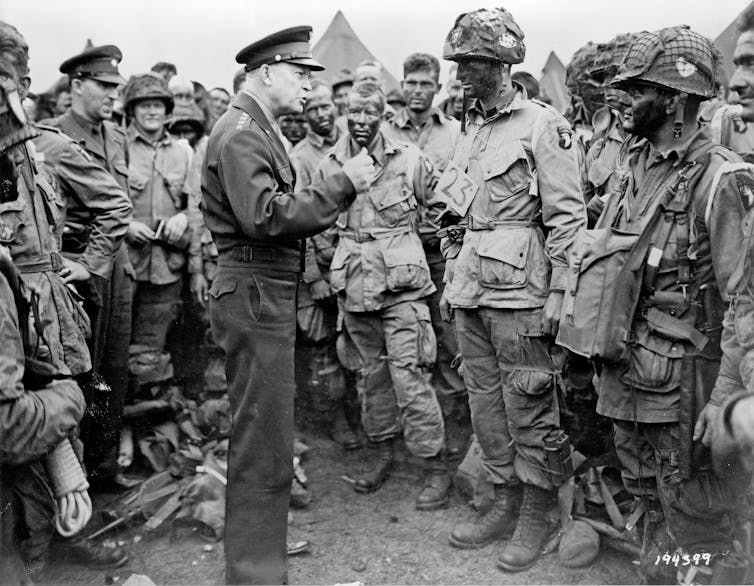
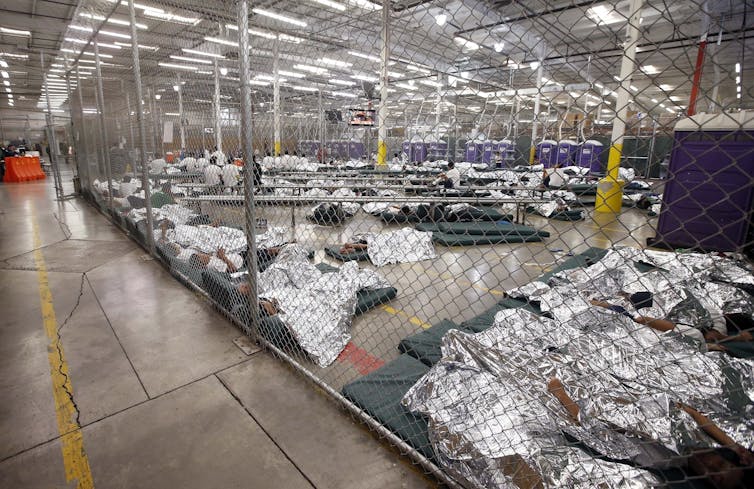
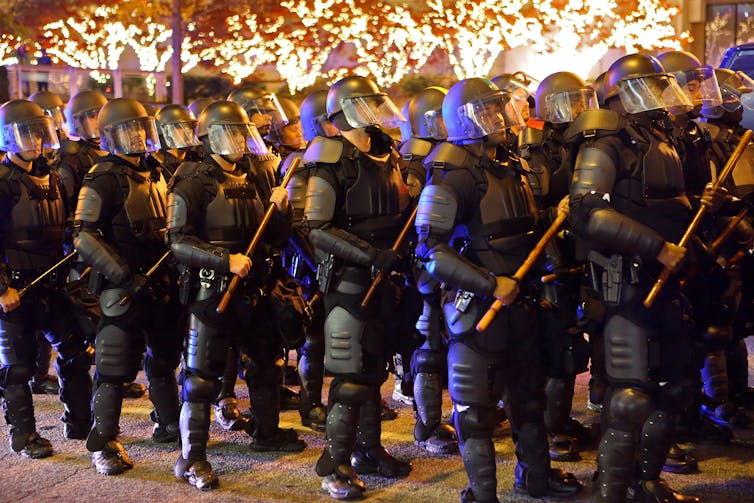
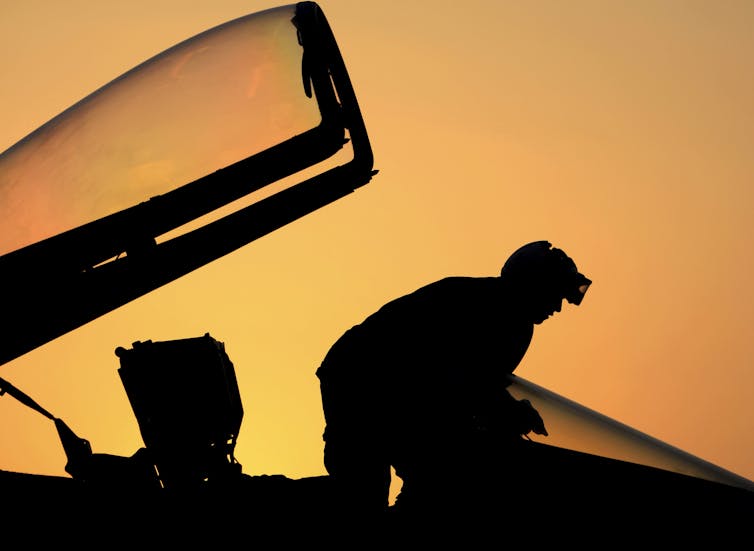


 is hardly a novel idea. For just a few (of endless) examples, one may recall Anti-Terrorism and Effective Death Penalty Act (1996), Espionage and Sedition Act (1917), National Defense Authorization Act (2011), or the FBI Counterintelligence Program, COINTELPRO (technically 1956-1971, but probably still going). Also, the interned Japanese-Americans in the 1940s just might have something to say about FDR’s concept of “freedom.” Doling out and taking away rights is essentially a side quest for America’s power elite.
is hardly a novel idea. For just a few (of endless) examples, one may recall Anti-Terrorism and Effective Death Penalty Act (1996), Espionage and Sedition Act (1917), National Defense Authorization Act (2011), or the FBI Counterintelligence Program, COINTELPRO (technically 1956-1971, but probably still going). Also, the interned Japanese-Americans in the 1940s just might have something to say about FDR’s concept of “freedom.” Doling out and taking away rights is essentially a side quest for America’s power elite.




